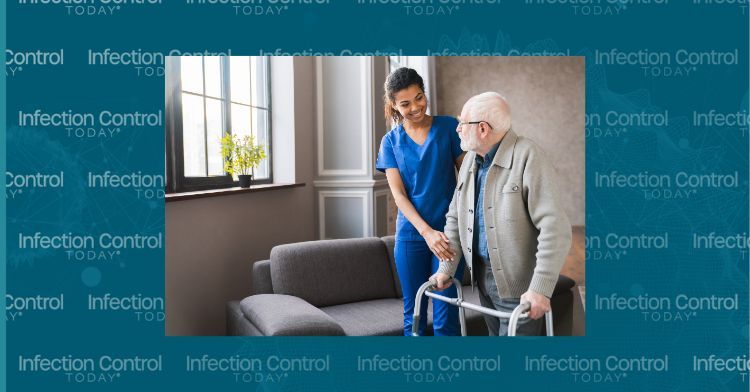Infection
Universal Decolonization Prevents Infection/Hospitalization According to Study’s Results
Senior patient of nursing home moving with walking frame and nurse support
(Adobe Stock 429992527 by InsideCreativeHouse)
Nursing home residents face a substantial risk of infection and hospitalization, primarily due to the presence of multidrug-resistant organisms. Nevertheless, a recent study offers a ray of hope in mitigating this pressing concern. The research reveals that nursing homes employing a technique termed “universal decolonization,” involving a bathing regimen that employs readily available antiseptic solutions to cleanse the skin and nasal passages, have successfully averted severe infections and significantly reduced the prevalence of antibiotic-resistant organisms within their facilities.
The study, “Decolonization in Nursing Homes to Prevent Infection and Hospitalization,” was published in The New England Journal of Medicine.
Data were collected from 28 nursing homes, encompassing a total of 28,956 residents. In the routine-care group, transfers to a hospital during the baseline period were attributed to infection in 62.2% of cases (with this being the mean across all facilities). This infection-related transfer percentage increased slightly to 62.6% during the intervention period. The risk ratio between these 2 periods was essentially 1.00, with a 95% confidence interval (CI) spanning from 0.96 to 1.04.
Conversely, the decolonization group exhibited a more pronounced shift. In this group, 62.9% of transfers to a hospital during the baseline period were due to infection, but this percentage significantly decreased to 52.2% during the intervention period. The risk ratio for this shift was notably reduced to 0.83, with a 95% CI ranging from 0.79 to 0.88. Comparing the decolonization group with routine care, the difference in risk ratio was 16.6% (with a 95% CI between 11.0 and 21.8), and this difference was statistically significant (P < .001).
Examining the discharges from nursing homes in the routine-care group transfers to a hospital for any reason accounted for 36.6% during the baseline period and slightly increased to 39.2% during the intervention period. The risk ratio between these 2 periods was 1.08, with a 95% CI spanning from 1.04 to 1.12.
In the decolonization group, the corresponding figures were 35.5% during the baseline period and 32.4% during the intervention period. The risk ratio for this shift was 0.92, with a 95% CI ranging from 0.88 to 0.96. When comparing the decolonization group with routine care, the difference in risk ratio was 14.6%, with a 95% CI between 9.7 and 19.2.
The number needed to treat (NNT) was calculated to be 9.7 to prevent 1 infection-related hospitalization and 8.9 to prevent 1 hospitalization for any reason.
The study’s findings contribute to a growing body of research that underscores the effectiveness of universal decolonization in preventing infections within at-risk populations within the health care system.

